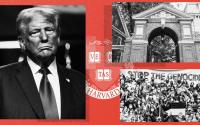18 December 2005Jennifer Loven
President GeorgeW Bush strongly defended authorising a secret eavesdropping programme yesterday, and said he has no intention of halting the practice.
In his weekly radio address broadcast from the White House, he lashed out at those involved in revealing its existence, and said using secret phone taps to monitor overseas calls from the United States is crucial in preventing future terrorist attacks on America.
"This is a highly classified programme that is crucial to our national security," he said. "This is a vital tool in our war against the terrorists. It is critical to saving American lives.
"The American people expect me to do everything in my power, under our laws and constitution, to protect them and their civil liberties and that is exactly what I will continue to do as long as I am president of the United States."
Angry members of Congress – Republicans and Democrats – have demanded an explanation of the programme, first revealed in Friday's New York Times. The newspaper claimed the National Security Agency (NSA) has monitored the phone calls and e-mails of hundreds of people without obtaining court warrants, which could violate civil liberties.
The Bush administration initially did not confirm that the programme existed. Yesterday, however, Bush said the measures were narrowly designed and used "consistently with US law and the constitution".
The President said the practice is only used to intercept the international communications of people inside the United States who have been determined to have "a clear link" to al-Qaeda or related terrorist organisations.
The programme is reviewed every 45 days, using fresh threat assessments, legal reviews by the justice department, White House counsel and others, and information from previous activities under the programme, Bush said.
Without identifying specific politicians, Bush said Congressional leaders have been briefed more than a dozen times on the programme's activities.
The President also said the intelligence officials involved in the monitoring are given extensive training to ensure that civil liberties are not violated.
Bush, who appeared angry at times during his eight-minute address, said he had personally re-authorised the programme more than 30 times since the terrorist attacks on September 11, 2001, and plans to continue doing so.
"I intend to do so for as long as our nation faces a continuing threat from al-Qaeda and related groups," he said.
The President contended that the programme has helped "detect and prevent possible terrorist attacks in the US and abroad", but did not provide specific examples.
He said it is designed in part to fix problems raised by the 9/11 Commission – the independent inquiry into the terrorist attacks – which found that two of the suicide hijackers had been communicating from San Diego with al-Qaeda operatives overseas.
"The activities I have authorised make it more likely that killers like these 9/11 hijackers will be identified and located in time," he said.
Democrat Senator Russell Feingold said the President's remarks were "breathtaking in how extreme they were", and it was "absurd" that Bush relied on his inherent power as President to authorise the phone taps.
"If that's true, he doesn't need the Patriot Act [anti-terrorism legislation passed after the 2001 attacks] because he can just make it up as he goes along. I tell you, he's President George Bush, not King George Bush.
"This is not the system of government we have and that we fought for," Feingold said.
The New York Times article was published on the day Congress was trying to renew elements of the controversial Patriot Act, which gives law enforcement agencies secret but legal access to library and medical records during investigations of suspected terrorist activity, and some forms of phone taps.
The newspaper report clearly affected the progress of the extensions, with a handful of Republicans joining Democrats to stall the bill. Those opposing the renewal of key provisions of the Patriot Act which are due to expire at the end of this month say the measures threaten constitutional liberties.
Bush, however, also had harsh words for those who talked about the phone-tapping programme to the media, saying their actions were illegal and improper.
"As a result, our enemies have learned information they shouldn't have," he said.
However, enraged politicians have threatened to hold hearings and investigations into why the NSA was allowed to eavesdrop on people without first going to a court for approval.
Republican Senator Arlen Specter, chairman of the powerful judiciary committee, said on Friday that he would make oversight hearings by his panel "a very, very high priority … there is no doubt that this is inappropriate".
Senator Ted Kennedy, a Democrat, said the phone-tapping programme was "Big Brother run amok".






